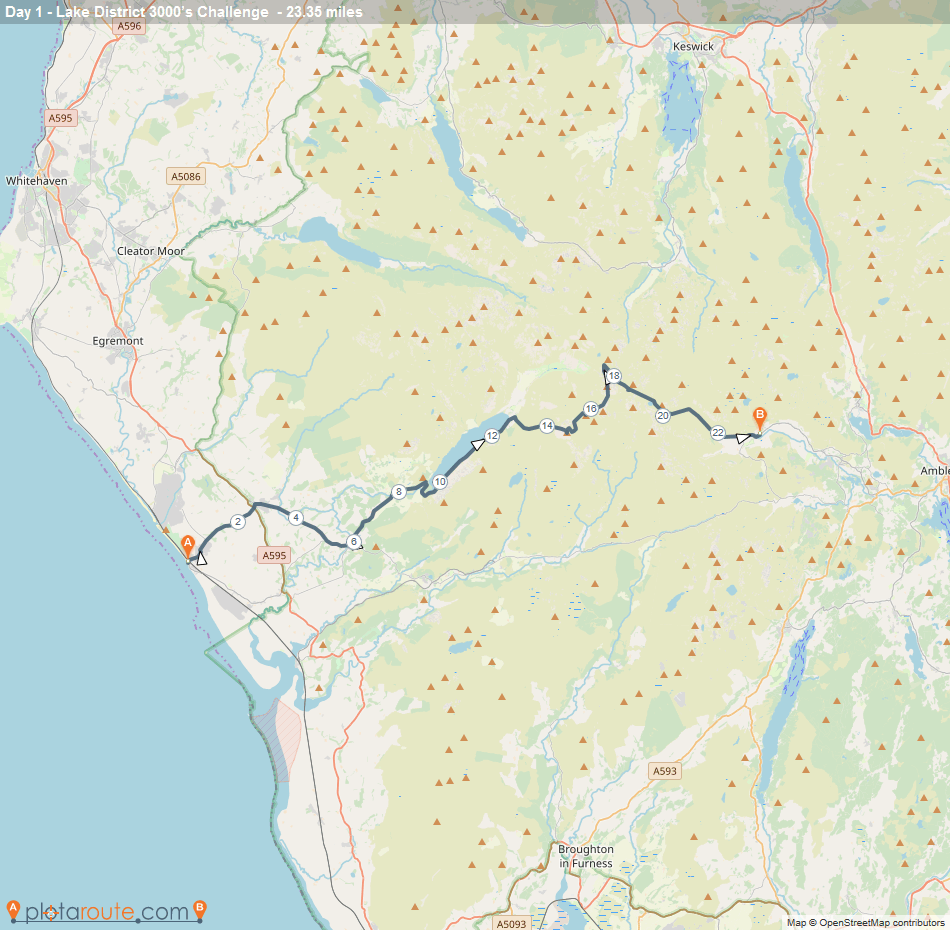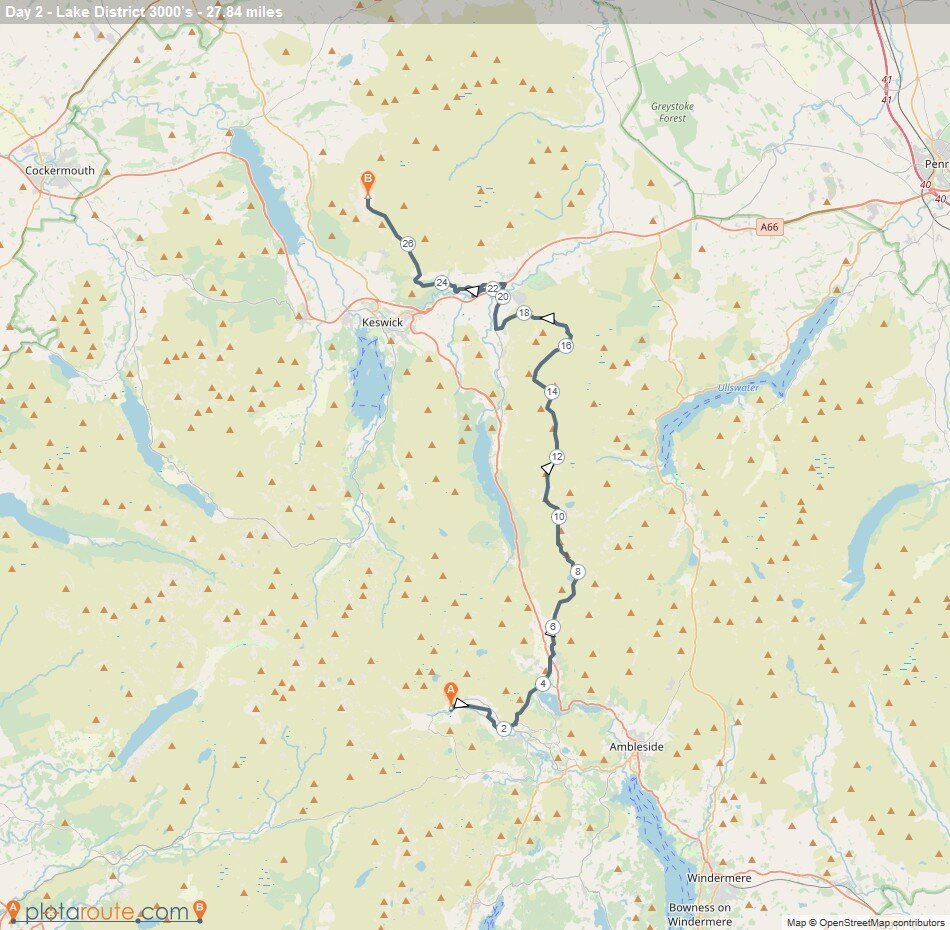Matt Knowles to complete an 80 km swim-run challenge across the Lake District

Interview by Conan Marshall
Photography: Luke Briggs
Matt Knowles, an A-Level student and member of the British U20 mountain running team, will be completing an 80 km swim-run across the Lake District.
He’s running for a worthy cause by fundraising for the Devon Wildlife Trust’s Beaver project and their efforts to reintroduce beavers across England. Starting his journey at the coast of the Irish Sea at Seathwaite, Matt will aim to summit the four highest peaks in the Lake District, while swimming in one of the highest lakes in the UK. In this interview we talk with Matt about his Lake District challenge and how he got inspired to start running competitively.
Visit his crowdfunding page here: www.crowdfunder.co.uk/the-future-of-english-beavers.
Matt Knowles, part of the British U20 mountain-running team
I found that you helped British U20 mountain-running team win gold at the 2019 World Mountain Running championships in Patagonia, Argentina, coming in 5th place yourself. Could you tell us about this experience?
The 2019 World Championships was a special event. It was my first GB vest and my first time in South America. I went over with a very strong team who seemed confident about the potential of medalling as a team. The other three members of my team were a little bit older and more experienced, so I mostly followed their lead and learnt a great deal from them. The race itself was fast and aggressive from the start with the technical and muddy course playing into the hands of the British team.
I followed my teammate Matt Mackay on the first two climbs, knowing he was running well after coming fourth at the European Championships earlier that year. I was unaware of how well I was actually doing in the race until the course opened up onto the streets of Vila La Angostura for the final kilometre to the finish line.
I was aware that many athletes in the race compete internationally for cross country or track so I really had to attack this flatter, smoother section of the course to keep my top five position. It was an incredible experience in a fascinating country which I very much hope to return to.
What has it been like to grow up around the Lake District and how has it aided your competitive running journey so far?
Growing up in the south Lake District area certainly influenced my interest in mountain running and outdoor activity in general. My parents took me hillwalking and climbing from a young age and after competing in a handful of local races for my primary school, I joined Lancaster and Morecambe AC aged 13.
Despite running my first fell race at Clough pike in 2014, it was not until 2018 that I started racing properly over the fells and began to progress as an athlete. The local fell running scene in the North West is very strong with hundreds of races organised each year. The junior races often had a strong turn out, but it was the senior races which really helped me to develop. After turning 16 I began to race with the adults where the distances were longer, climbs were steeper, and the competition was stronger and more experienced. Pushing myself against the stronger, faster senior runners really benefited me when I was back racing with the juniors.
Matt Knowles during his training. Photo: Luke Briggs
Why have you chosen to raise money for the Devon Wildlife Trust and their efforts to reintroduce Beavers across England?
In 2014, The Devon Wildlife Trust opposed the UK Government’s decision to remove beaver kits (young beavers) from the River Otter. They have been monitoring and recording beaver populations there ever since with the hope of expanding the re-introduction of beavers to more rivers. Ecological benefits of beavers and the habitats which their dams provide are just a few of the benefits which beaver reintroduction would bring.
After they became extinct in Britain in the 16th century due to hunting, beaver reintroduction trials are yielding very promising results, but the Devon Wildlife Trust needs continued financial support in order to maintain the monitoring and protection of beavers. I am also hoping that financially supporting their work on the River Otter may lead to the future reintroduction of beavers into my local areas such as the Lake District or Yorkshire Dales.
By pursuing running and gaining a high level of endurance at such an early age, has it helped you gain confidence and mental strength that you’ll be able to take through life?
The discipline and determination instilled by training for an endurance sport has undoubtedly benefited me in other aspects of life – be it school, work or other sporting endeavours. Most importantly, I have developed a greater appreciation for the relationship between training and good results. Despite having raced competitively in some form for over 7 years, it was only when I became disciplined with my training and really focused on my weaknesses that I started to see an improvement in my results. Racing for England for the first time in 2018 gave me a lot more confidence and encouraged me to set myself more ambitious goals. Discovering this affinity between effort and reward was a real turning point for me.
How has your preparation been for the 80 km swimrun?
The preparation for this challenge has been much more fun than my usual training schedule, with swim-run practice, scouting trips after school and longer steady runs to build up a strong aerobic base.
On a typical training week, I would usually run between 70-80km with one tempo session, one hills session, a track speed session and one long run. I would make up the rest of my mileage with steady runs. In preparation for this challenge I have simply reduced the intensity of training whilst increasing the weekly mileage. This can often be difficult to fit in around school and other commitments, but I usually enjoy training so don’t see it as a massive burden.
Photo: Luke Briggs
Can you elaborate on how you became part of the British U20 mountain running team?
The selection race for the British Under 20 World Championships mountain running team was one of most painful, yet rewarding races I have competed in. I entered the race in reasonably good form having won the U19 FRA English Championships that year, but I knew that making the top four to be selected would be extremely difficult as all four runners from the GB European championships team were racing as well as a strong mix of Scottish and Welsh athletes.
The race took us up the shoulder of Moel Eilio in Snowdonia before a fast descent down towards Llanberis. I struggled on the climb, reaching the summit trigpoint in seventh place so I really had to push myself to make up ground on the descent. I ran more and more aggressively as I passed people until I could see the third placed runner crossing the line ahead of me and I finished in fourth place.
However, the hot conditions and steep descent had caused my heels to rub the soles of my shoes which left me with badly blistered feet. After a few days on crutches and another few weeks out of running, I was able to continue to my training. The injury caused by this race was worth it as I was selected to race for GB for the first time, but it taught me an important lesson about the dangers of pushing yourself too hard in a race.
A section of this challenge will be taken onto the water. Photo: Luke Briggs
In terms of the route, are there certain sections which you are looking forward to (or dreading)?
Deciding the route for this challenge wasn’t easy with so many well recognised endurance challenges already established in the Lake District. The decision to do a swim-run was inspired by the semi-aquatic nature of beavers, who depend on both land and water to feed, build dams and escape predators. A swim-run would also challenge me as an athlete as, although I enjoy swimming and am comfortable in the water, I have never done extended periods of open water swimming before.
The first day involves running from Seascale on the Cumbrian coast to Langdale whilst summiting both Scafell and Scafell Pike with swimming sections in Wastwater and Angle tarn. In total, around 38km of running with 1800m of ascent. The second day continues from Langdale towards Grasmere before a steep climb onto Helvellyn via Grisedale Tarn. From here I continue north along the tops before dropping down from Clough Head towards Threlkeld. I will finish the 42km day with a final ascent of Skiddaw.
Beginning on the 24th October, Matt will start in the Irish Sea near Seathwaite. He will run 80km over two days, summiting Sca Fell, Scafell Pike, Helvellyn and Skiddaw, swimming in Wastwater, Sprinkling Tarn and Grisedale Tarn along the way.
If you want to find out more about Matt and his fundraising visit, https://www.crowdfunder.co.uk/the-future-of-english-beavers
Photo: Luke Briggs







